- Home
- Darrell Maloney
A Troubling Turn of Events
A Troubling Turn of Events Read online
Countdown
to Armageddon
Book 11:
A TROUBLING
TURN OF EVENTS
By Darrell Maloney
This is a work of fiction. All persons depicted in this book are fictional characters. Any resemblance to any real person, living or dead, is purely coincidental.
Copyright 2017 by Darrell Maloney
This book is dedicated to:
the best group of readers any author’s ever had.
I do some very dumb things. I frequently pour myself a cup of coffee, then leave it on the counter to get cold. I sometimes go the market to buy something, then return home because I forgot what I went to buy. I park my car in a sprawling parking lot and spend half an hour (while my ice cream is melting) trying to find it again.
I try my best to keep my books interesting and fun and error-free. I really do. But I’m human, after all, and make way more than my share of mistakes. Most are caught during the editing process, but alas, my editors are human too.
Sometimes a boo-boo slips through to the final product.
You, my readers, are the finest people in the world.
Or my world, anyway.
Even when I misname a character or do something else remarkably stupid, you forgive me.
That’s what makes you all amazing.
And why I love each and every one of you…
THE STORY THUS FAR…
Life has changed so much in the two years since the world went black.
For the vast majority of Americans, life has ended. Only ten percent of the population has survived.
That ten percent is not the same.
All have gotten tougher. Not necessarily because they wanted to, but because they had to. To be soft in the modern world is to be taken advantage of. For there are still bands of marauders out there too lazy to hunt for their own meat. Too lazy to grow their own crops. Too willing to just steal from others.
The survivors have learned to adapt too. Those who didn’t know how to hunt, fish and trap small game before the blackout have learned, again out of necessity. Those who didn’t know beans about growing crops learned. Those who couldn’t do either one learned to barter their skills or services to others who did.
New alliances were formed.
Men who were tough, for example, but who lacked gardening skills, might offer themselves to provide security for a neighborhood. They might help build walls around the neighborhood, might bring in abandoned cars to block access to it, might stand guard at night.
All for a seat at the dinner table.
And a new place to call home.
The entrepreneurial spirit is alive and well.
Gardeners learn to specialize, and to barter. One person who is particularly good at growing cantaloupes might grow only cantaloupes. She might then peddle them around the neighborhood, trading her extras for beans, squash and peppers.
Ingenuity, still the mother of invention, thrives in all kinds of ways. One man, knowing the soil in San Antonio is full of clay and not suitable for growing potatoes, spends weeks loading up bags of potting soil from every home improvement store within five miles.
His friends and neighbors think he’s crazy as they see him push one shopping cart after another to the vacant lot next to his home, each load stacked as high as his head with bags of potting soil.
He’s crazy, all right… crazy like a fox.
It takes him months of gathering and building, but when he’s finished he’s used the lumber and plywood from a nearby construction site to build a half-acre sized planting box, full of potting soil mixed with top soil.
And he has the only potato and carrot farm within a hundred miles.
It’s not enough potatoes and carrots to feed the entire city of San Antonio, and it wasn’t meant to be.
But it gives him enough to barter for his meat and other food, as well as anything else he needs.
Other entrepreneurs team up to open retail stores.
Since all the urban stores, all the abandoned tractor trailers and all the food storage warehouses have been picked clean by now, they go outside the city.
Some go on bicycles fitted with saddle bags, with backpacks on their backs. Others ride horses and lead pack horses behind them. They head to the highways surrounding the city, where it’s still possible to find trucks which haven’t been picked clean yet.
It’s on those trucks they’re still able to find things like pasta, liquor and fresh clothing that have become increasingly rare within the confines of the city.
They lug it all back and peddle it in abandoned convenience stores.
If the stores’ owners were still around they might take exception to such people squatting on their property.
But the stores’ owners are long gone.
City leaders and the local police have no problems with such practices.
They see the peddlers as a good thing.
As a sign the city is beginning to normalize.
There are still a lot of problems, to be sure.
The marauders are still causing havoc.
People have learned it’s become ridiculously easy to commit murder. They settle old grudges with guns now, knowing there’s little chance they’ll ever be arrested or charged.
A depleted police force does what it can, but has precious little manpower or resources to investigate most crimes.
In San Antonio Deputy Police Chief John Castro has been promising his family for months he’d get them away from the city.
They’d paid their due. All of them.
And he fully intended to accept an invitation from friends northwest of the city, in the tiny town of Junction, to relocate to a place where the pace is slower. Where life is simpler.
Where they can finally relax.
Oh, John isn’t planning to retire. He isn’t the type. Wouldn’t know what to do with his free time.
He’ll still keep his hand in law enforcement. For he couldn’t just stay idle when there were things to be done to help keep his community safe.
But being an undeputized consultant to the Kerr County Sheriff was a lot different than being the deputy chief of a large metropolitan police force.
It would be more relaxed, less taxing for sure.
Or maybe not.
As John’s making plans to relocate, his friends in Junction are struggling.
Struggling to bounce back from a second round of electromagnetic pulses.
Most of their electronics have been damaged or destroyed. And while they were luckier than most non-preppers who’d already learned to live without electricity, they were fighting to the end their own return to the age of dark nights and the lack of modern conveniences.
They’ve gotten their security system working again, albeit in a limited capacity.
They still had three working vehicles: Tom’s 1963 Ford, a tractor and a Gator utility vehicle.
They had working radios, and they had Charles.
Young Charles was a troubled soul who’d come to them from an orphanage in San Antonio.
He’d been abused for years and bore the emotional scars. He was, by all accounts, a young man who was difficult to live with.
Jordan once called him a “real pain in the ass,” and Charles beamed. He seemed to take great pride in knowing how difficult he was.
Yet in other ways Charles was conforming. He was beginning to accept his role in the new family he fought so hard not to join.
His hard shell was starting to crack. He was volunteering to help around the compound. To finally contribute to the collective good.
Charles had the small and steady hands of a boy and a mind which seemed to grasp electronics. He could make repa
irs to circuit cards and electronics that the others were incapable of.
For the first time he was proving his worth, and that made him proud in another way.
He could still be a pain in the ass, but now he was a contributing and productive one.
The others were contributing in their own way.
Kerr County fared better than San Antonio and the other cities, mostly because its residents were more resilient.
Many of Kerr County’s residents were ranchers or farmers, and the county itself was mountainous and full of wildlife.
It was an outdoorsman’s paradise before the blackout and a great source of food for those who knew how to hunt and fish.
And virtually everyone in Kerrville and Kerr County were hunters or fishermen.
Tom Haskins was the sheriff of Kerr County, which covered almost two hundred square miles. It was a daunting job with only three deputies and three working patrol vehicles.
But they did the best they could.
Sara Harter was Scott’s daughter-in-law and Charles’ and Millicent’s adopted mom.
She was one of Tom’s deputies-in-training before the pair went to San Antonio to retrieve Sara’s mother and to bring her back to the Junction compound.
After their return she wanted her job back, but Tom wasn’t so sure.
“You’ve got three kids now. Your place is with them, not driving around the county looking for bad guys.”
Sara was headstrong; some would say stubborn.
“I can do both,” she maintained.
Tom stood strong.
Truth was, he knew she was capable. But he’d come to think of her as the daughter he never had. The hesitance he had in bringing her back onto the force was more an effort to protect her than a lack of confidence in her abilities.
Both of them knew he’d eventually give in.
And then there was Bill.
Bill was a remarkable man. A man with a disadvantage the other survivors didn’t have to deal with, and which made his life so much harder.
Bill had a condition called Pervasive Developmental Disorder, or PDD. What that meant was that his body developed faster than his mind.
It wasn’t debilitating, in that Bill could be taught to do anything any other man could do.
But some things he had a hard time dealing with, for he was a five year old boy trapped in a twenty-five year old man’s body.
Bill was lucky enough to have survived at all once his brother and caretaker passed away.
And to be sure, it wasn’t easy for him. He’d only made it by eating the dead bodies of people in his neighborhood who’d committed suicide or fell victim to marauders.
John Castro first met him when he was hunting a man he thought to be a sadistic murderer and cannibal.
Instead he found a man-boy who was eating human flesh because he simply knew no other way to stay alive.
Instead of arresting Bill, John found him a home on Baker Street.
And that’s where we left off in the previous installment…
At Bill’s twenty-sixth birthday party.
And now, Book 11 of the series,
A TROUBLING TURN OF EVENTS
-1-
Most of the boxes Bill tore into contained things like new shirts and socks and toiletry items.
Things which he needed, for the new world was a place where people had pretty much cast aside luxury items.
But Bill was still a five-year old boy, at least in his mind, and behaved as a five-year old would.
“Thank you, Mister David,” he exclaimed, trying to feign excitement even as he was tossing aside a new pair of jeans and reaching for the next box.
As much as he enjoyed reading to Scarlett and having her read to him, he did the same thing with the books he unwrapped. Unless Spiderman adorned the front cover he tossed them aside.
And since “Miss Scarlett,” as he called her, was trying to instill in him a love for classic literature, Spiderman wasn’t a likely subject.
He did pause, though, when he pulled a copy of Huck Finn from one box.
But only long enough to ask “Who in heck is Huck Finn?”
He did get a few things from several of the more soft-hearted Baker Street residents he enjoyed. A jigsaw puzzle from Frank. An electric train from Mr. and Mrs. Blake. They bought it from a prepper and paid a hefty price for it: one of Mrs. Blake’s gold cocktail rings.
But they were assured it worked.
When he opened the last gift, a fishing rod from John and Hannah Castro, he got up and went around the yard, collecting hugs from his new friends.
Tony Martinez, a San Antonio cop and one of Bill’s “bestest friends,” told Bill, “Not so fast, buddy. You forgot one.”
He walked over to the garage and raised the door.
He went inside and dragged out a large cardboard box, and Bill’s face lit up like a neon sign.
The size and shape of the box, and the name “Huffy” on its sides, were dead giveaways.
Eddie was a great brother to Bill until he died a few months before. He advocated for him before the world went to hell, always making sure he was seen by the best doctors and had the best special education teachers.
It was Eddie who moved five times in three years, trying to find the school in San Antonio which was the best fit for his little brother.
It was Eddie who protected Bill from bullies and those who’d take advantage of him. Who did everything for Bill. Who always made sure he had clean clothes to wear and a full plate of food.
In all likelihood Eddie never entertained the thought he’d die at such a young age and leave Bill behind.
If he’d considered that possibility he’d have done a better job preparing his little brother.
When Eddie died, Bill wasn’t left with any of the skills he’d need to survive on his own.
He couldn’t shoot a gun or defend himself in a fight. His fishing skills were rudimentary. He couldn’t cook his meals or clean his laundry. In short, he was totally incapable of fending for himself.
He also couldn’t ride a bicycle, though he’d always wanted to.
“Wow, Mr. Tony! I never had a real-life bike before. Eddie said I couldn’t ever have one, on account of I’d fall down and crack my head and all my brains would spill out and then he’d have a heck of a mess to clean up.”
He paused and a worried look came over his face.
“Do you think he was kidding, Mr. Tony? On account of I don’t really want my brains to spill out. I’m pretty sure I need them.”
Tony smiled.
“Don’t worry about that, little buddy. I have a solution for that. Hang on a minute.”
Tony ran back into the garage while Bill, mouth wide open, closely examined the cardboard box. Even the bike’s container had a magical fascination for him.
Tony returned with an adult-sized safety helmet, black in color and adorned with lightning bolts on each side.
Painted across the front and back was the name “Bill.”
Tony added that at the last minute as a personal touch.
As Bill ripped open the box Scarlett took Tony aside and whispered, “Where in heck did you get that thing, and how’d you get it in your garage without anybody seeing it?”
“I got them at the old bike shop over on Culebra Avenue, and pushed them here balanced on top of a shopping cart from the A&P Store.”
“How’d you get it in here without Bill seeing you?”
“I stashed them in a vacant house on the next block and waited until dark. Jonas was on guard duty that night and I told him I had a present for Bill on the outside.
“Jonas offered to help me put it together, but I thought it would mean more to Bill if he helped me with it. Plus, then he’d learn how to do it if he ever had to assemble another one.”
“Wait a minute. Did you say, “them?”
“Yes. I brought back two of them. One’s for me.”
“But it’s not your birthday. It’s Bill’s.”
“And when he’s able to ride far enough, I’ll take him out to the edge of town on resupply runs. There are still a lot of trucks out there that haven’t been emptied out yet.”
On perfect cue, Bill called out, “But Mr. Tony, I can’t put this together by myself. Can you help me?”
He smiled and called back, “I’ll be right there, Bill. Go in the house and get my tool box, would you?”
“Okay!”
“Wait until you see his face when he comes out,” Tony told Scarlett.
“Why?”
“On top of my toolbox I left three things for him to find.
“A bicycle horn, a headlight, and a little license plate that says ‘Bill’”.
Baker Street had no adolescent children.
But Bill was a more than adequate substitute.
.
-2-
It was the first time Sara had driven in… well, she couldn’t remember the last time.
And as happy as she was to have them, her “new” wheels were certainly nothing fancy.
For a 1975 Chevrolet Silverado, the pickup ran pretty darn good, considering it was way older than she was.
And as much as she enjoyed riding horses, this was much nicer.
The air conditioner even worked, though Hal had to bypass the fuse box and install a toggle switch on the dash board to turn it on and off.
“It has two speeds,” Hal explained. “To the right is Arctic blast and to the left is off. There ain’t no in between, sorry.”
“Arctic blast or nothing is fine. Thank you.”
She reached up and kissed him on the cheek, which was no small feat because Hal stood over six feet and she was a little spit of a woman.
Hal was pushing seventy, a retired auto mechanic, and a good friend of Tom’s. They’d known each other since they grew up on opposite ends of the same block. They went to the same grade school, two years apart, and used to skip school together to go fishing several times a year.

 A Perilous Journey
A Perilous Journey The Yellowstone Event: Book 6: The Aftermath
The Yellowstone Event: Book 6: The Aftermath Eden Bound
Eden Bound Without Warning
Without Warning Everything Has Changed
Everything Has Changed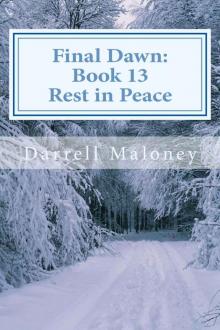 Rest in Peace
Rest in Peace This Changes Everything
This Changes Everything The Final Chapter
The Final Chapter It Can't Be Her
It Can't Be Her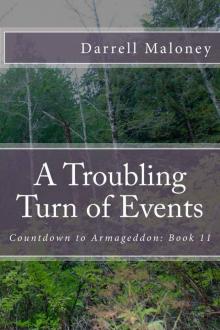 A Troubling Turn of Events
A Troubling Turn of Events The Blockade
The Blockade A Tearful Reunion
A Tearful Reunion Countdown to Armageddon
Countdown to Armageddon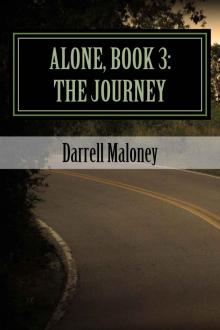 Alone, Book 3: The Journey
Alone, Book 3: The Journey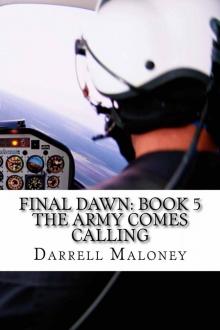 The Army Comes Calling
The Army Comes Calling The Grim Reaper Comes Calling
The Grim Reaper Comes Calling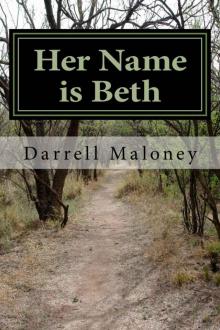 Her Name is Beth: Alone: Book 5
Her Name is Beth: Alone: Book 5 Red: The Adventure Begins
Red: The Adventure Begins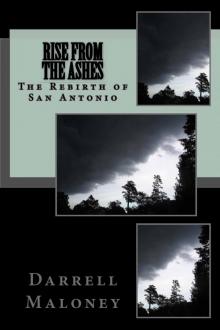 Rise From The Ashes: The Rebirth of San Antonio (Countdown to Armageddon Book 3)
Rise From The Ashes: The Rebirth of San Antonio (Countdown to Armageddon Book 3) An Unkind Winter (Alone Book 2)
An Unkind Winter (Alone Book 2)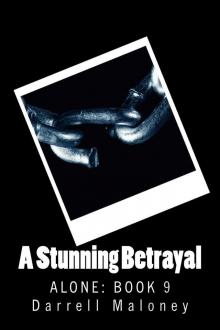 A Stunning Betrayal: Alone: Book 9
A Stunning Betrayal: Alone: Book 9 A Whole New World: Ranger: Book 2
A Whole New World: Ranger: Book 2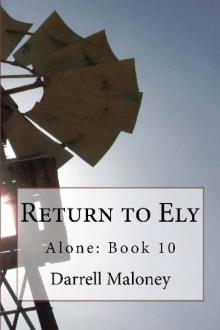 Return To Ely
Return To Ely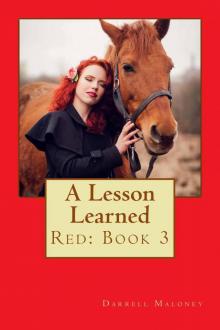 A Lesson Learned: Red: Book 3
A Lesson Learned: Red: Book 3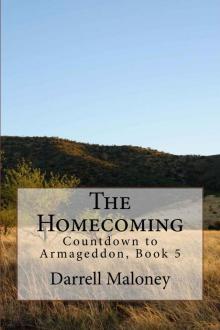 The Homecoming: Countdown to Armageddon: Book 5
The Homecoming: Countdown to Armageddon: Book 5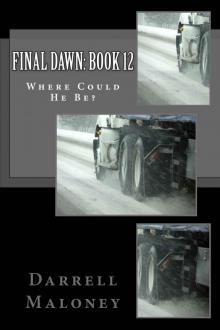 Final Dawn: Book 12: Where Could He Be?
Final Dawn: Book 12: Where Could He Be?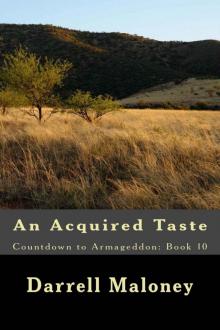 An Acquired Taste
An Acquired Taste On Desert Sands: Alone: Book 6
On Desert Sands: Alone: Book 6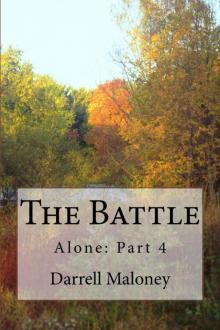 The Battle: Alone: Book 4
The Battle: Alone: Book 4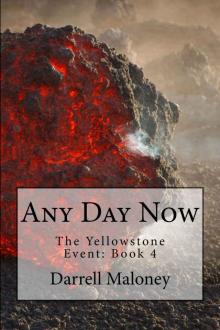 Any Day Now
Any Day Now Too Tough To Tame: Red: Book 2
Too Tough To Tame: Red: Book 2 No Help From Austin: Red: Book 5
No Help From Austin: Red: Book 5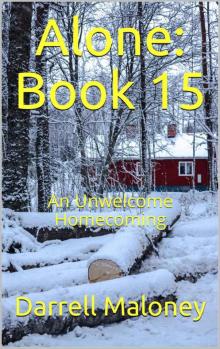 An Unwelcome Homecoming
An Unwelcome Homecoming A New Start: Final Dawn: Book 9 (Volume 9)
A New Start: Final Dawn: Book 9 (Volume 9)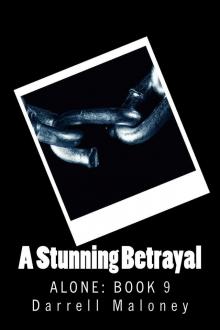 A Stunning Betrayal
A Stunning Betrayal An Undeclared War (Countdown to Armageddon Book 4)
An Undeclared War (Countdown to Armageddon Book 4) One of Our Own: Final Dawn: Book 11
One of Our Own: Final Dawn: Book 11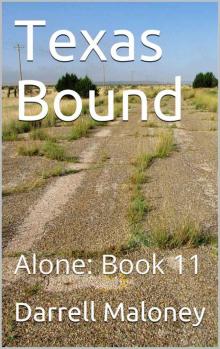 Texas Bound: Alone: Book 11
Texas Bound: Alone: Book 11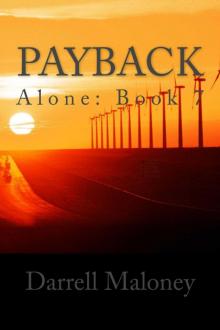 Payback: Alone: Book 7
Payback: Alone: Book 7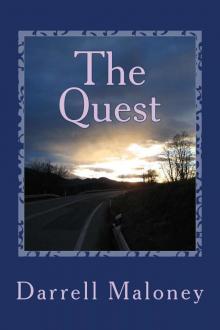 The Quest: Countdown to Armageddon: Book 6
The Quest: Countdown to Armageddon: Book 6 The Siege
The Siege The Yellowstone Event: Book 1: Fire in the Sky
The Yellowstone Event: Book 1: Fire in the Sky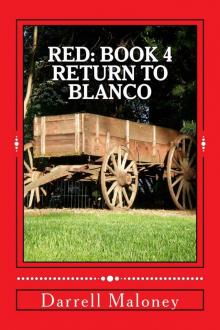 Return to Blanco (Red Book 4)
Return to Blanco (Red Book 4) The Search
The Search AFTER THE DUST SETTLED (Countdown to Armageddon Book 2)
AFTER THE DUST SETTLED (Countdown to Armageddon Book 2)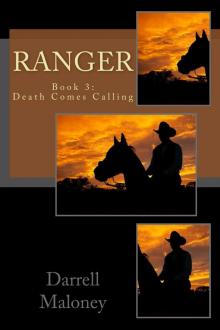 Death Comes Calling (Ranger Book 3)
Death Comes Calling (Ranger Book 3)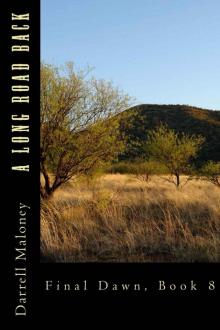 A Long Road Back: Final Dawn: Book 8
A Long Road Back: Final Dawn: Book 8